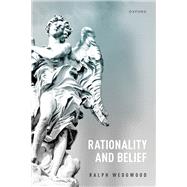Rationality and Belief
, by Wedgwood, Ralph- ISBN: 9780198874492 | 0198874499
- Cover: Hardcover
- Copyright: 9/2/2023
This book gives a general theory of rational belief. Although it can be read by itself, is a sequel to the author's previous book The Value of Rationality (Oxford, 2017). It takes the general conception of rationality that was defended in that earlier book, and combines it with an account of the varieties of belief, and of what it is for these beliefs to count as “correct”, to develop an account of what it is for beliefs to count as rational. According to this account, rationality comes in degrees: the degree to which one's beliefs counts as rational is determined by their distance from a corresponding probability function - where this distance is measured by those beliefs' “expected degree of incorrectness” according to the probability function; the account also involves an explanation of what determines exactly which probability function plays this role in each case, and of why this probability function should play this role.
In developing and defending this account, new light is shed on several central epistemological issues. These issues include: the distinction between propositional and doxastic justification; the debates between internalism and externalism, and between foundationalism and coherentism; the significance - or lack of it - of the notion of 'evidence'; the relationship between credences, full belief, inference, and suspension of judgment; the nature of the kind of possibility that is presupposed by the relevant sort of probability; and whether rationality is “diachronic” - so that the beliefs that it is rational for us to have now depend, in part, on the beliefs that we held in the past. Finally, some suggestions are made about how this theory bears on a range of further topics, including the defeasibility of inference, scepticism, and the analysis of knowledge.
In developing and defending this account, new light is shed on several central epistemological issues. These issues include: the distinction between propositional and doxastic justification; the debates between internalism and externalism, and between foundationalism and coherentism; the significance - or lack of it - of the notion of 'evidence'; the relationship between credences, full belief, inference, and suspension of judgment; the nature of the kind of possibility that is presupposed by the relevant sort of probability; and whether rationality is “diachronic” - so that the beliefs that it is rational for us to have now depend, in part, on the beliefs that we held in the past. Finally, some suggestions are made about how this theory bears on a range of further topics, including the defeasibility of inference, scepticism, and the analysis of knowledge.







